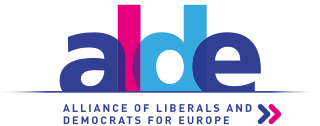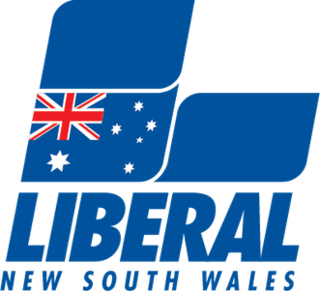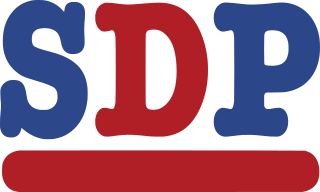
The Liberal Democratic Party of Germany was a political party in East Germany. Like the other allied bloc parties of the Socialist Unity Party of Germany (SED) in the National Front, it had 52 representatives in the People's Chamber.

The Liberal Party is a liberal political party in the United Kingdom that was founded in 1989 as a continuation of the original Liberal Party by members who opposed its merger with the Social Democratic Party (SDP) to form the Liberal Democrats. The party holds five local council seats. The party promotes a hybrid of both classical and social liberal tendencies.
Green liberalism, or liberal environmentalism, is liberalism that includes green politics in its ideology. Green liberals are usually liberal on social issues and "green" on economic issues. The term "green liberalism" was coined by political philosopher Marcel Wissenburg in his 1998 book Green Liberalism: The Free and The Green Society. He argues that liberalism must reject the idea of absolute property rights and accept restraints that limit the freedom to abuse nature and natural resources. However, he rejects the control of population growth and any control over the distribution of resources as incompatible with individual liberty, instead favoring supply-side control: more efficient production and curbs on overproduction and overexploitation. This view tends to dominate the movement, although critics say it actually puts individual liberties above sustainability.
Young Liberals is the youth and student organisation of the British Liberal Democrats. Membership is automatic for members of the Liberal Democrats aged under 30. It organises a number of fringe events at the Liberal Democrat Conference, which is held twice each year.

Pro-Europeanism, sometimes called European Unionism, is a political position that favours European integration and membership of the European Union (EU).

The Alliance of Liberals and Democrats for Europe is a transnational alliance between two European political parties, the Alliance of Liberals and Democrats for Europe Party and the European Democratic Party. ALDE has political groups in the European Parliament, the EU Committee of the Regions, the Parliamentary Assembly of the Council of Europe and the NATO Parliamentary Assembly. There are assorted independents in these groups as well as national-level affiliate parties of the European-level parties.
The Alliance of Free Democrats – Hungarian Liberal Party was a liberal political party in Hungary.

The Hungarian Democratic Forum was a centre-right political party in Hungary. It had a Hungarian nationalist, national-conservative, Christian-democratic ideology. The party was represented continuously in the National Assembly from the restoration of democracy in 1990 until 2010. It was dissolved on 8 April 2011.
This article gives an overview of liberalism in Armenia. It is limited to liberal parties with substantial support, mainly proved by having had representation in the National Assembly of Armenia.

The New South Wales Liberal Party, officially called the Liberal Party of Australia, New South Wales Division, and colloquially known as the NSW Liberal Party, is the state division of the Liberal Party of Australia in New South Wales. The party is currently in Opposition in New South Wales in a coalition with the National Party. The party is part of the federal Liberal Party which is in opposition on the mainland of Australia, with Tasmania being the exception.
A leadership election is a political contest held in various countries by which the members of a political party determine who will be the leader of their party.
The Democratic Party of the United States is a big tent party composed of various factions. The four most prominent modern factions are the liberals, moderates, progressives, and conservatives. The liberal faction supports modern liberalism and social liberalism that began with the New Deal in the 1930s and continued with both the New Frontier and Great Society in the 1960s. The moderate faction supports Third Way politics that includes center-left social policies and center-right fiscal policies. The progressive faction supports social democracy and left-wing populism. The conservative faction supports centre-right policies. The traditional conservative Democratic faction lost much of its influence in the 21st century as the South realigned towards the Republican Party, though a subsequent realignment starting in the 2010s brought a new set of moderate to conservative voters disillusioned with Trumpism in the Republican Party, prominently including many suburban women, into the Democratic tent.

The Liberal Democrat Conference, also known inside the party as the Liberal Democrat Federal Conference, is a twice-per-year political conference of the British Liberal Democrats, the third-largest political party in the UK by the number of votes cast. The Conference is typically held over three days in Spring and four in Autumn, during the party conference season, at a variety of venues. It culminates in a speech by the party's Leader.
National League of Young Liberals (NLYL), often just called the Young Liberals, was the youth wing of the British Liberal Party. It was in existence from 1903 to 1990. Together with the party's student wing, the Union of Liberal Students (ULS), the organisations made up the Young Liberal Movement. In 1988, the ULS merged with the Social Democratic Party's own student wing, and in 1990 the youth and student sections themselves merged to form Liberal Democrat Youth and Students (LDYS). It was renamed Liberal Youth in Spring 2008, and then as Young Liberals in December 2016. The NLYL played a significant role in the development of Liberal thought and action, particularly from the 1960s until the end of the 1980s.

The Liberal Democrats are a liberal political party in the United Kingdom, founded in 1988. Since the 1992 general election, with the exception of the 2015 general election, they have been the third-largest UK political party by the number of votes cast. They have 15 members of Parliament in the House of Commons, 84 members of the House of Lords, four Members of the Scottish Parliament and one member in the Welsh Senedd. The party has nearly 3,000 local council seats. The party holds a twice-per-year Liberal Democrat Conference, at which party policy is formulated. In contrast to its main opponents' conference rules, the Lib Dems grant all members attending its Conference the right to speak in debates and vote on party policy, under a one member, one vote system. The party also allows its members to vote online. The party served as the junior party in a coalition government with the Conservative Party between 2010 and 2015; with Scottish Labour in the Scottish Executive from 1999 to 2007, and with Welsh Labour in the Welsh Government from 2000 to 2003 and from 2016 to 2021.

The Group of the Alliance of Liberals and Democrats for Europe was the liberal–centrist political group of the European Parliament from 2004 until 2019. It was made up of MEPs from two European political parties, the Alliance of Liberals and Democrats for Europe Party and the European Democratic Party, which collectively form the Alliance of Liberals and Democrats for Europe.
The Democratic Party, commonly referred to as The Democrats, was a left-wing pro-independence political party formed in 1946 by Prince Sisowath Youtevong, who had previously been a member of the French Section of the Workers' International. It was the sole dominant party in Cambodia from 1946 until the creation of Sangkum in 1955.

The Social Democratic Party (SDP) was a centrist to centre-left political party in the United Kingdom. The party supported a mixed economy, electoral reform, European integration and a decentralised state while rejecting the possibility of trade unions being overly influential within the industrial sphere. The SDP officially advocated social democracy, but its actual propensity is evaluated as close to social liberalism.

LGBT+ Liberal Democrats is a British lesbian, gay, bisexual, transgender and other sexual minorities equality group of the Liberal Democrats political party. The organisation is one of several Specified Associated Organisations, giving it special status within the party, and has been referred to as one of the "most important" of such groups. The group campaigns both within the party and UK-wide on LGBT+ issues, as well as mentoring and providing advice to the party's candidates.

The 187th New York State Legislature, consisting of the New York State Senate and the New York State Assembly, met from January 7, 1987, to December 31, 1988, during the fifth and sixth years of Mario Cuomo's governorship, in Albany.











